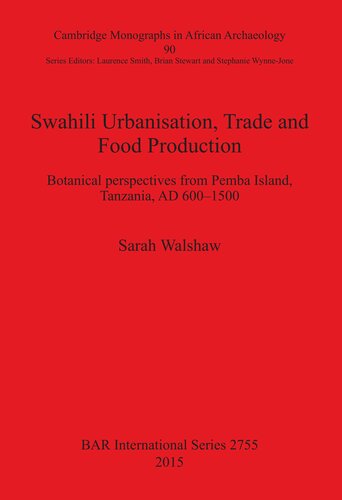

Most ebook files are in PDF format, so you can easily read them using various software such as Foxit Reader or directly on the Google Chrome browser.
Some ebook files are released by publishers in other formats such as .awz, .mobi, .epub, .fb2, etc. You may need to install specific software to read these formats on mobile/PC, such as Calibre.
Please read the tutorial at this link: https://ebookbell.com/faq
We offer FREE conversion to the popular formats you request; however, this may take some time. Therefore, right after payment, please email us, and we will try to provide the service as quickly as possible.
For some exceptional file formats or broken links (if any), please refrain from opening any disputes. Instead, email us first, and we will try to assist within a maximum of 6 hours.
EbookBell Team

4.3
58 reviewsThis monograph examines Swahili plant subsistence and food production patterns through the analysis of macrobotanical remains from four archaeological sites on Pemba Island, Tanzania, dating to A.D. 700-1600. Specifically towns and villages are compared before and during the emergence of stonetowns, settlements characterized by stone/coral household and ritual architecture, which have been described as urban, based on their roles as economic, political, and religious centers along the eastern African coast. Swahili stonetowns are hypothesized to have exerted political control over the immediate hinterland for the purposes of obtaining trade items and staple goods, including plant products. Based on ethnohistoric reports, a wide variety of collected and cultivated plants have been previously proposed as being central to Swahili consumption and production economies including trees in mangrove habitats, coconut, sorghum, pearl millet, and Asian rice. Moreover, it has often been assumed that stonetowns obtained plant products, including staple grains, from the countryside and were not themselves primary food producers. These assumptions are tested directly against the archaeological record in this first comprehensive study of ancient Swahili plant foods.